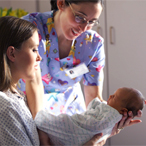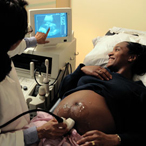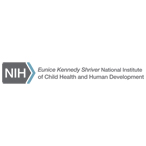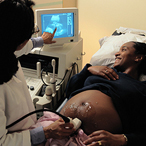Proper maternal folate levels during pregnancy may protect children from a future risk of obesity, especially those born to obese mothers, according to a study funded by NICHD.
News
NICHD issues News Releases and Media Advisories to the news media. Spotlight and Research Feature articles explain NICHD research findings and public health issues to the general public. An Item of Interest is a short announcement of relevant information, such as a notable staff change.
What if It Isn’t the “Happiest Time of Your Life”?
Countering the stigma and isolation often felt with depression and anxiety disorders around pregnancy is central to a new initiative launched in May, Moms’ Mental Health Matters.
Couples’ pre-pregnancy caffeine consumption linked to miscarriage risk
A woman is more likely to miscarry if she and her partner drink more than two caffeinated beverages a day during the weeks leading up to conception, according to a new study from researchers at the National Institutes of Health and Ohio State University, Columbus.
Prenatal exposure to marijuana may disrupt fetal brain development, mouse study suggests
Fetal mice exposed in the uterus to delta-9-tetrahydrocannabinol (THC), marijuana’s primary psychoactive ingredient, lose a key subset of neurons, according to a new study by NICHD researchers.
Air pollution linked to higher risk of preterm birth for mothers with asthma
Pregnant women with asthma may be at greater risk of preterm birth when exposed to high levels of certain traffic-related air pollutants, according to a study by researchers at NICHD and other institutions.
Pre-pregnancy potato consumption may be linked to gestational diabetes risk
Women who eat more potatoes before pregnancy may have higher rates of gestational diabetes—the form that occurs during pregnancy—compared to women who consume fewer potatoes, suggests a National Institutes of Health (NIH) study.
Spotlight: NICHD Needs Your Input for the All of Us Research Program
NICHD needs your input for NIH’s All of Us program.
Selected NICHD Research Advances of 2015
Over the past year, NICHD contributed to numerous scientific advances and key initiatives.
HIV Transmission from Mother to Child: From Epidemic to Near Elimination
Children are most likely to get HIV from their mothers in one of three ways: in the womb, during birth, or from breastfeeding or breast milk. NICHD research has helped establish safe and effective ways to prevent this type of HIV transmission. Check out our infographic to learn more.
NIH invests $46 million in technologies to monitor placental health
The National Institutes of Health has announced $46 million in research awards for the Human Placenta Project, an initiative to revolutionize understanding of the placenta. The awards will fund technology development and testing to assess placental function throughout pregnancy, with the ultimate goal of improving pregnancy outcomes and lifelong health.
Exploring Population Dynamics
NICHD’s Population Dynamics Branch supports research on a range of topics, including the factors that make populations rise and fall, such as fertility and mortality. We checked in with branch chief Rebecca Clark to learn more about the branch’s work.
Environmental Influences on Child Health Outcomes
NIH seeks input on a proposed new research program to assess biological, chemical, psychosocial, and other environmental influences on child health outcomes. Join one of NIH’s webinars to learn more.
Q&A with Human Placenta Project Coordinator David Weinberg
In 2014, NICHD launched the Human Placenta Project (HPP), a new initiative to revolutionize our understanding of the human placenta and its role in health and disease.
NIH announces $41.5 million in funding for the Human Placenta Project
The National Institutes of Health has dedicated $41.5 million for an initiative to understand and monitor the development of the human placenta during pregnancy. The funding will support the development of new technologies to assess the health of the placenta as it grows and matures, with the ultimate goal of improving the health of mothers and children.
Study Reaffirms Safety of Anti-HIV Drugs During Pregnancy
The antiretroviral drugs used to keep HIV at bay are an unqualified success at preventing the spread of the virus from mother to child. The drugs are not only essential for maintaining the health of a pregnant woman with HIV, they have also nearly eliminated the transmission of HIV to her baby. Among U.S. women, the likelihood of a mother passing the virus on to her child is now less than 1%.
NICHD Hosts Upcoming Lecture on Fetal Individualized Medicine
The next NICHD Director’s Lecture at the NIH will feature Diana Bianchi, M.D., from Tufts University School of Medicine. Her talk, titled “Changing Paradigms: From Prenatal Genetic Diagnosis to Fetal Individualized Medicine,” will take place on January 21, 2015, 9:00–10:00 a.m., in Lipsett Amphitheater, at NIH’s Clinical Center in Bethesda, Md.
NIH-sponsored study identifies superior drug regimen for preventing mother-to-child HIV transmission
For HIV-infected women in good immune health, taking a three-drug regimen during pregnancy prevents mother-to-child HIV transmission more effectively than taking one drug during pregnancy, another during labor and two more after giving birth, an international clinical trial has found.
NICHD Blogs about Safe Infant Sleep on Parents.com
Shavon Artis, Dr.P.H., M.P.H., coordinator of the NICHD-led Safe to Sleep® campaign, recently published a blog post on safe infant sleep environments for the Parents Magazine website.
August Wrap-Up: Promoting Safe and Healthy Pregnancies
This August, we focused on pregnancy—providing information, tips, and resources, plus a chance for members of the public to chat with experts over a Twitter #pregnancychat.
An Aspirin a Day for Preeclampsia Prevention
Aspirin is generally not recommended during pregnancy, as it can lead to bleeding problems for both mother and baby. But for some women, the benefits of a daily low-dose aspirin after the first trimester may outweigh the risk.
 BACK TO TOP
BACK TO TOP



















